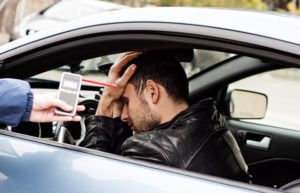
What happens if you get a DWI while on probation will depend on the terms of your probation and the nature of the original case. The defendant may be subject to time in jail or prison, a fine, or both. Sometimes the judge suspends the imposition of imprisonment, confinement, or a fine and places the defendant on another probation instead.
The DWI could land you back in trouble for the original offense and make the DWI charges worse than they otherwise would be. The impact on your life can be devastating.
An Overview of Probation
When a person gets convicted of a criminal offense, the judge can impose one or more of several sentencing options, depending on the offense. The judge may also suspend the sentence of confinement and impose a sentence of probation. Probation, also called community supervision, is not a “get out of jail free” card. The original sentence still hangs over the defendant’s head during the entire time of probation.
Texas law allows a judge to impose any reasonable condition to the probation order. A condition of probation is that the defendant does not violate any other law or commit any criminal offense before the probation term expires. A DWI arrest can be a probation violation if the state seeks to prove it. If a defendant is convicted of DWI, the state has much less work to prove the probation violation.
What Can Happen in Texas After a Probation Violation
Texas Code of Criminal Procedure Art. 42A.108 sets out the procedure our courts follow if someone violates the terms of probation. The defendant can get arrested and detained for a probation violation, which can include a DWI charge or DWI conviction.
If a judge finds in a hearing that the defendant violated any of the terms of the probation, the judge can impose punishment for the violation and immediately impose the original sentence as in the original conviction.
The evidence in the hearing must be more than uncorroborated polygraph test results. The defendant could face two sentences—one for the DWI and one for the original conviction for which he was serving probation.
When a Previous Conviction Can Lead to Enhanced Penalties for a DWI
If the original conviction for which the judge suspended the sentence and placed the defendant under probation was an alcohol-related offense, the defendant’s criminal charges and sentence in the DWI case could be more severe than otherwise.
Texas Penal Code Ch 49.04 provides the possibility of enhanced offenses and penalties if the defendant has a previous conviction for performing any of these activities while intoxicated:
- Operating a motor vehicle, aircraft, or watercraft
- Operating or assembling an amusement ride
The defendant could face a minimum confinement term of 30 days. In some situations, the criminal charges can get enhanced to a third-degree, second-degree, or first-degree felony. This fact is true even if the previous conviction was in a state other than Texas.
How Getting a DWI Conviction While on Probation Can Impact Your Life
Once the DWI conviction is final, the consequences will follow as a matter of course. You could lose your job, lose your professional license, and not get the chance to get into your preferred university.
You and your family could have to endure the social stigma that comes with criminal convictions. You will have to disclose the convictions on job applications for the rest of your life. You might not get to enter the profession of your dreams. Even renting a decent apartment could be out of reach.
Your future could get damaged beyond repair if you get a DWI while on probation. Your only hope is to fight the DWI charges. Our Houston, TX DWI lawyers can go to work to fight for the best possible outcome by building a strong defense and taking the case to trial, getting a dismissal or negotiating a plea bargain with the prosecutor.
Count on Blass Law to Represent You
Our firm’s founder, Jay Blass Cohen, has worked in criminal defense for his entire legal career. He is a Lawyer Scientist and has certifications in field sobriety testing, which gives him the knowledge to raise defenses when the arresting officer does not follow proper procedures. He fights hard to protect his clients’ legal rights.
Every day that passes could be a lost opportunity to protect your future. We need to stay working on your case immediately. What happens at the early hearings can change the entire course of your criminal case. Call Blass Law today at (713) 664-4000 to get started and learn about how we may be able to help you minimize the impact a DWI has on your life.
